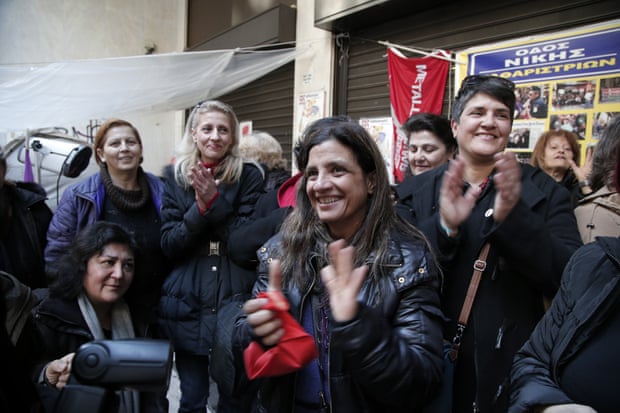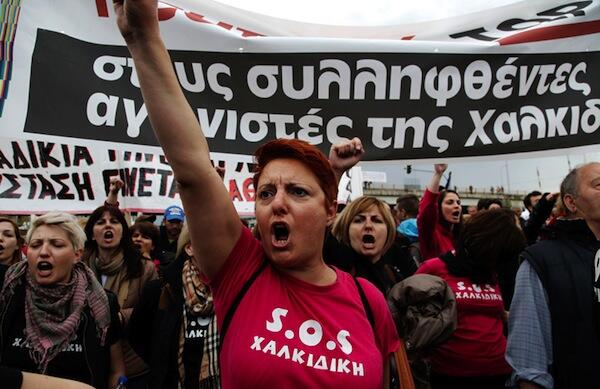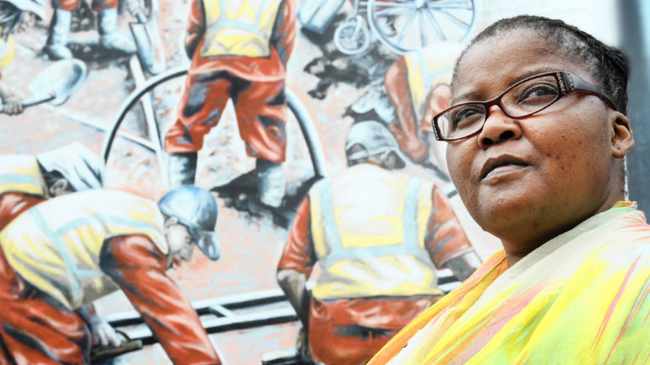
Ministry of Finance laid-off women cleaners react as they watch the new Greek Finance Minister Yanis Varoufakis announcing that the government will re-hire them, in Athens, on January 28, 2015
In Athens, the women cleaners of the Ministry of Finance knew that what was thrown in the trash was to be disappeared. When the Troika ordered that women like them be replaced by contracted workers in order to save Greece, they knew that their lives were supposed to end up in the trash cans. The women cleaners knew that the structural adjustment programs imposed on Greece with ice cold effrontery were as those that had been imposed catastrophically on many other emergent countries. The Preliminary Report of the Truth Committee on Public Debt has established enough elements to assert the dual role of the Troika: bail out the foreign banks; continue the destruction of public services.
The Troika was formed to extend and legitimize the neoliberal project of transferring private debt onto the public sector.
The public sector means us, and, among us, women are the most affected. The women cleaners knew that the crisis of the public debt was a way to bring ordinary people to their knees. They knew that corruption and fraud were being rewarded and aggravated with the memoranda of the Troika. They knew about the corporate media campaign to “portray the population as deservers of their own wrongdoing.”
Their action in front of the minister lasted until the election of Syriza, and epitomizes the resistance to the looting of Greece by this political system of debt. They already discovered the fictitious contracts with Siemens, German French and US banks and speculators. Thanks to bribes from armaments corporations like Thales, Greece boasted the highest expenditure on armaments of the EU countries, proportionate to the size of its economy. The State bought Leopard tanks without contracts and even bought F16 fighter jets from Lockheed Martin … without the engines.
The Olympic games of 2004 were overbilled using outrageous interest rates. Siemens “loaned” its security system, which never worked, and the list of fraudulent and deceitful contracts is long.
The Preliminary Report also describes the falsification of public deficit and public debt using financial techniques to inflate public debt in 2009. The illegal private contracts disappeared from view, and what was left was that people of Greece had to be punished for this dubious public debt. Déjà vu!
The preliminary report defines four types of debt: illegitimate, illegal, odious, and unsustainable. It concluded that Greece’s public debt was an assembly of the four. It infringed on the fundamental human rights of the Greek population. The Preliminary Report clearly established the impact of the measures, especially for women and migrants: “The crisis hit disproportionately women and migrants increasing involuntary part time work and unfair dismissals due to pregnancy.” The Troika made the world believe that it was moral to cut hospital and health care spending to honor military contracts; that it was moral to send people to their death for an economic shell game. The list of negative impacts of the “bail out” program on human rights is equally long.
The women cleaners knew that all along! They fought with courage to re humanize their lives along with the lives of many, our lives!
Let’s remind the creditor-embezzlers represented by the Troika that we are not fooled and they cannot deceive the civil population anymore, although they are still trying. The Truth Committee on Public Debt is an important process, which can only succeed with popular mobilization. The women cleaners of the Ministry of Finance showed the way.

